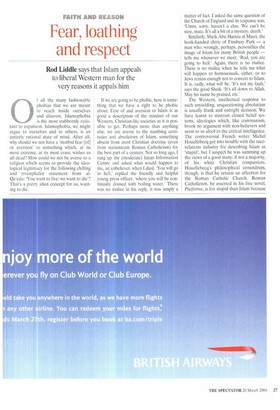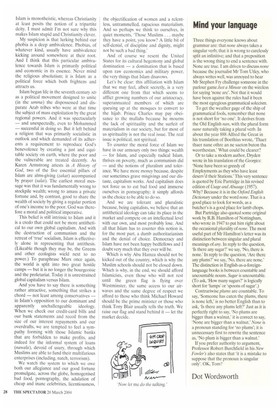Fear, loathing and respect
Rod Liddle says that Islam appeals to liberal Western man for the very reasons it appals him
0 f all the many fashionable phobias that we are meant to reach inside ourselves and disavow, Islamophobia is the most stubbornly resistant to expulsion. Islamophobia, we might argue to ourselves and to others, is an entirely rational state of mind. After all, why should we not have a 'morbid fear [of] or aversion' to something which, at its most extreme, at its most crass, wishes us all dead? FIONN could we not be averse to a religion which seems to provide the ideological legitimacy for the following chilling and triumphalist statement from alQa'eda: 'You want to live: we want to die'? That's a pretty alien concept for us, wanting to die.
If we are going to be phobic, here is something that we have a right to be phobic about. Fear of and aversion to Islam is as good a description of the mindset of our Western, Christian-lite societies as it is possible to get. Perhaps more than anything else, we are averse to the numbing certitudes and absolutism of Islam, something absent from most Christian doctrine (even from mainstream Roman Catholicism) for the best part of a century. Not so long ago, I rang up the (moderate) Islam Information Centre and asked what would happen to me, an unbeliever, when I died. 'You will go to hell,' replied the friendly and helpful young press officer, 'where you will be continually doused with boiling water.' There was no malice in his reply, it was simply a matter of fact. I asked the same question of the Church of England and its response was, `Umm, sorry. haven't a clue. We can't be sure, mate. It's all a bit of a mystery, death.'
Similarly, Sheik Abu Hamza al Masri, the hook-handed cleric of Finsbury Park — a man who, wrongly, perhaps, personifies the image of Islam for many British people — tells me whenever we meet, 'Rod, you are going to hell.' Again, there is no malice. There is no malice when he tells me what will happen to homosexuals, either, or to Jews remiss enough not to convert to Islam. It is, sadly, what will be. 'It's not my fault,' says the good Sheik. 'It's all down to Allah. May his name be praised, etc.'
The Western, intellectual response to such unyielding, unquestioning absolutism is usually frank and outright derision. We have learnt to mistrust closed belief systems, ideologies which, like communism, brook no argument with non-believers and seem to us aloof to the critical intelligence. The controversial French writer Michel Houellebecq got into trouble with the racerelations industry for describing Islam as 'stupid', but I suspect he was summing up the views of a good many, if not a majority, of his white Christian compatriots. Houellebecq's philosophical conundrum, though, is that he retains an affection for the Roman Catholic Church. Roman Catholicism, he asserted in his fine novel, Platforme, is less stupid than Islam because Islam is monotheistic, whereas Christianity at least posits the notion of a tripartite deity. I must admit I'm not sure why this makes Islam stupid and Christianity clever.
My suspicion is that lurking behind our phobia is a deep ambivalence. Phobias, of whatever kind, usually have ambivalence kicking around somewhere at their root. And I think that this particular ambivalence towards Islam is primarily political and economic in its essence. Never mind the religious absolutism; it is Islam as a political force which both frightens and attracts us.
Islam began life in the seventh century AD as a political movement designed to unite (in the umma) the dispossessed and disparate Arab tribes who were at that time the subject of mass exploitation by the great regional powers. And it was spectacularly
— and unexpectedly, even to Mohammed
— successful in doing so. But it left behind a religion that was primarily socialistic in outlook and which demanded of its adherents a requirement to reproduce God's benevolence by creating a just and equitable society on earth, where the poor and the vulnerable are treated decently. As Karen Armstrong attests in A History of God, two of the five essential pillars of Islam are alms-giving (zakat) accompanied by prayer (salat). The earliest moral message was that it was fundamentally wrong to stockpile wealth; wrong to amass a private fortune and, by contrast, good to share the wealth of society by giving a regular portion of one's income to the poor. God was therefore a moral and political imperative.
This belief is still intrinsic to Islam and it is a credo that could not be more antithetical to our own global capitalism. And with the destruction of communism and the retreat of 'true' socialism, Islam is effectively alone in representing that antithesis. (Likeable though they may be, the Greens and other ecologists wield next to no power.) To paraphrase Marx once again, the world is split into two great hostile camps — but it is no longer the bourgeoisie and the proletariat. Today it is unrestrained global capitalism versus Islam.
And you have to say there is something rather attractive, something that strikes a chord — not least among conservatives — in Islam's opposition to our dominant and apparently unchallengeable ideology. When we check our credit-card bills and our bank statements and recoil from the size of our interest repayments and our overdrafts, we are tempted to feel a sympathy forming with those Islamic banks that are forbidden to make profits, and indeed for the informal system of loans (nawala), devoid of usury, through which Muslims are able to fund their multifarious enterprises (including, natch, terrorism).
We watch the system to which we owe both our allegiance and our good fortune promulgate, across the globe, homogenised bad food, pornography, the adulation of cheap and inane celebrities, licentiousness, the objectification of women and a relentless, untrammelled, rapacious materialism. And so perhaps we think to ourselves, in quiet moments, 'Those Muslims . . maybe they have a point, you know? A little bit of self-denial, of discipline and dignity, might not be such a bad thing.'
And of course we resent the United States for its cultural hegemony and global domination — a domination that is based upon raw economics and military power, the very things that Islam disavows.
Let's be clear: this affiliation with Islam that we may feel, albeit secretly, is a very different one from that which seems to afflict growing numbers of our aristocracy, superannuated members of which are queuing up at the mosques to convert to the hijab. Prince Charles may pay obeisance to the mullahs because he mourns the lack of spirituality and the surfeit of materialism in our society, but for most of us spirituality is not the real issue. The real issue is political, not spiritual.
To counter the moral force of Islam we have in our armoury only two things: wealth — for Islam, and especially radical Islam, thrives on poverty, much as communism did — and the notions of pluralism and tolerance. We have more money because, despite our sometimes grave misgivings and our distaste, capitalism works. And capitalism does not force us to eat bad food and immerse ourselves in pornography; it simply affords us the choice to be able to do so.
And we are tolerant and pluralistic because, being capitalists, we believe that an antithetical ideology can take its place in the market and compete on an intellectual level with our own, and most probably lose. And all that Islam has to counter this notion is, for the most part, a dumb authoritarianism and the denial of choice. Democracy and Islam have not been happy bedfellows and I doubt very much that they ever will be.
Which is why Abu Hamza should not be kicked out of the country, which is why the Muslim schools should not be closed down. Which is why, in the end, we should afford Islamicists, even those who will not rest until the green flag is flying over Westminster, the same access to our airwaves and the same degree of respect we afford to those who think Michael Howard should be the prime minister or those who think Tony Blair usually tells the truth. We raise our flag and stand behind it — let the market decide.



















































































 Previous page
Previous page